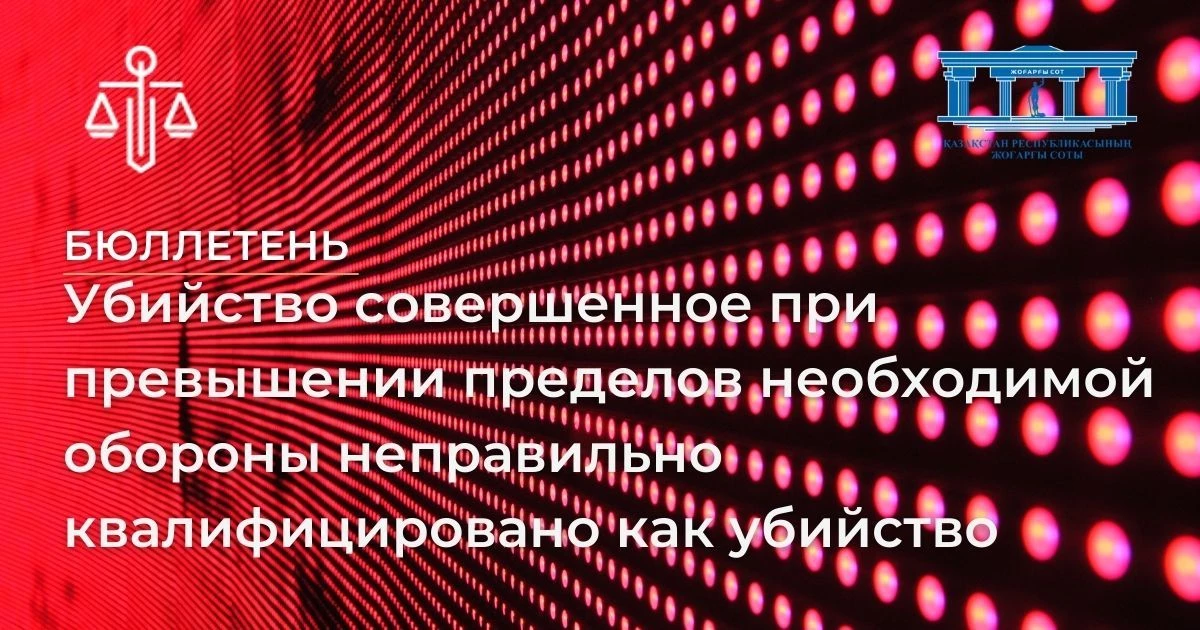A murder committed while exceeding the limits of necessary defense is incorrectly qualified as murder
By the verdict of the specialized interdistrict Criminal Court of the East Kazakhstan region dated April 26, 2012, M., was sentenced under part 1 of Article 96 of the Criminal Code to 6 years in prison and serving her sentence in a general regime penal colony. By a decision of the appellate instance of the East Kazakhstan Regional Court dated June 13, 2012, the court's verdict was changed, M.'s actions from part 1 of Article 96 of the Criminal Code were reclassified to Article 99 of the Criminal Code, according to which she was sentenced to 2 years in prison. On the basis of paragraph 2 of part 1 of Article 2 and Article 4 of the Law of December 28, 2011 "On amnesty in connection with the twentieth anniversary of the State Independence of the Republic of Kazakhstan" M. was released from criminal liability, the proceedings were terminated. By the decision of the cassation board of the East Kazakhstan Regional Court of September 11, 2012, the decision of the appellate instance of June 13, 2012 was canceled, while the verdict of the specialized interdistrict criminal court of the East Kazakhstan region of April 26, 2012 remained unchanged. The court of the first instance and then the cassation instance found convicted M. guilty of premeditated murder of victim S. The Supervisory Judicial Board of the Supreme Court, having considered the case at the request of the defense, overturned the decision of the court of cassation on the following grounds. The Court of first instance and the Court of cassation, in violation of the constitutional principle of the presumption of innocence, rejected evidence showing a lesser degree of guilt of the convicted person without sufficient grounds and interpreted the existing doubts not in favor of the defense, but on the contrary, in favor of the prosecution.
A murder committed while exceeding the limits of necessary defense is incorrectly qualified as murder
The convicted M. testified both during the preliminary and judicial investigation that S., being intoxicated, in the presence of her friend X. and his brother I. began to harass her, grabbing various parts of her body. At the same time, I. tried to calm him down. However, S. He did not pay attention to those present, hit her in the face. After that, she said she would go home, but he wouldn't let her go. At that time, H. and I. went out into the hallway, she also tried to leave the kitchen in order to get dressed. However, S. did not let go of her and began hitting her, reaching under her blouse, while threatening her with a knife. At that moment, she began to scream, but I. and H. did not hear her. Then S. struck her in the head area, which sent her flying into the kitchen room. She began to fight back with a knife, did not aim anywhere specifically, only fought off the attacks of S. The explanations of the convicted M. were confirmed in the materials of the criminal case. According to the testimony of witnesses Kh. and I., the victim had indeed harassed M. and subjected her to beatings. It follows from the forensic medical examination that the convicted M. suffered minor harm to her health, and at least 3 traumatic effects were applied to the localization of her injuries. The victim S. is characterized negatively at his place of residence, and criminal proceedings were refused against him under part 2 of Article 178 of the Criminal Code and part 2 of Article 181 of the Criminal Code in connection with his death. The convicted M. is characterized positively, brings up a minor son. The Court of first instance in its verdict, having correctly recognized that S. had committed a socially dangerous attack on M.'s personality, unreasonably came to the one-sided conclusion that M.'s retaliatory actions were dictated only by the hostility towards the victim. The conclusions of the court of cassation on the presence of elements of a crime in the actions provided for in part 1 of Article 96 of the Criminal Code are justified by the fact that M., in response to the actions of the victim, was very active and deliberately stabbed him. In such circumstances, guided by the principle of the presumption of innocence, the conclusions of the court of appeal should be recognized as justified that at the time of stabbing victim S., the convicted M. was in a state of necessary defense and at the same time obviously exceeded her limits. In this regard, the decision of the court of cassation instance is subject to cancellation, leaving the decision of the court of appeal unchanged. Based on the above, the supervisory judicial board of the Supreme Court overturned the decision of the cassation board of the East Kazakhstan Regional Court in respect of M., the decision of the appellate instance of the regional court in respect of M. remained unchanged. M. was immediately released from custody.
Attention!
Law and Law Law Law draws your attention to the fact that this document is basic and does not always meet the requirements of a particular situation. Our lawyers are ready to assist you in legal advice, drawing up any legal document suitable for your situation.
For more information, please contact a Lawyer / Attorney by phone: +7 (708) 971-78-58; +7 (700) 978 5755, +7 (700) 978 5085.
Attorney at Law Almaty Lawyer Legal Services Legal Advice Civil Criminal Administrative Cases Disputes Protection Arbitration Law Firm Kazakhstan Law Office Court Cases


